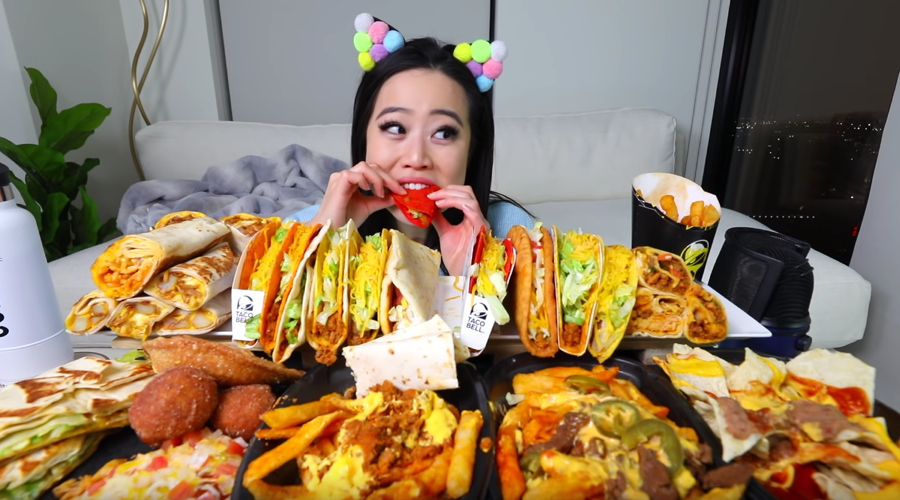An influencer sits in front of a table. Beside her are dozens of baby back ribs, a whole rack of lamb and a large bowl of noodles. In front of her is a large plate of shrimp, and surprise: another large set of baby back ribs.
The influencer takes one bite of the lamb and reaches for a baby back rib. As time passes, she takes her time slurping her noodles. When the camera pans out, viewers see that — to their surprise — there is so much more food than was originally shown, including several whole roast porks. As the influencer smiles, a mouth full of meat, she widely and happily proclaims that in this video, she will be eating all of it.
While this is only a fictional scenario of a Chinese mukbang, it’s not far from the truth. This debaucherous gormandizing is typical of a mukbang, during which people film or livestream themselves eating excessive quantities of food in one sitting, glorifying unhealthy eating habits. The trend first began in South Korea, but has become popular in many other East Asian countries, and even in the United States. It’s not uncommon for these mukbang personalities to eat anything and in huge quantities. In fact, these streamers, who often financially profit from their content, have built their entire followings on the shock value of excessive consumption.
At first glance, these videos may seem extreme but entertaining and don’t appear to be political in any way. They have garnered millions of views on Youtube and across other streaming platforms, and have resulted in the creation of thousands of popular Youtube channels and personalities.
So why has China banned them?
According to the Chinese government, mukbangs are not only promoting unhealthy eating habits, but they have contributed to the country’s food waste issue. A previous report from the World Wildlife Fund China stated that in China, 17 to 18 million tons of food were wasted in 2015 — enough food to feed 30 to 50 million individuals annually.
China’s campaign to crack down on food waste is largely motivated by rising food prices and a fear of food insecurity, as well as concerns over the continuing reliability of the global food supply chain during the coronavirus pandemic. This was realized in President Xi Jinping’s “Clean Plate” 2.0 campaign, which was launched amid the pandemic to monitor the amount of food that was being wasted in the country. To do this, President Xi asked all citizens to carefully consider how much food they order on a daily basis and to adhere to health guidelines by not overfilling plates and taking home food they cannot finish.
Food waste, in this regard, has become a moral issue in Chinese society. It has taken shape as an obstacle to China’s fulfillment of national values, which emphasizes both health and prosperity. In order to combat mukbang’s emphasis on unhealthy and “immoral” consumption, the Chinese government has turned to censoring internet celebrities. Government officials believe that mukbang personalities, many of whom have gained large followings online, play a role in actively promoting lifestyles that do not align with the Chinese vision of “cherishing” food.
Video platforms have heeded the call. Sina Weibo, China’s version of Twitter, has already stated that they would be restricting and banning content related to excessive consumption. Other platforms like Douyin and Kuaishou have echoed similar sentiments, even stating that internet users who search key terms like “competitive eater” and “eating show” will be redirected to healthier food content. Accounts who do not promote such values will be removed.
While it’s easy to dismiss this crackdown on food waste and mukbangs as only another example of China’s surveillance and censorship tactics, the issue is far more complex. It’s necessary to acknowledge that censorship serves as a mechanism for the CCP to strategically excise what does not conform to the government’s political views, and that the consumption of food has now become a central aspect of what is regulated. Mukbangs are an accessible target due to their visibility on Chinese social media.
However, what’s more clear is that warning against the dangers of mukbangs has become associated with upholding a version of China’s national identity, one that relies upon a projection of health and morality. Chief Washington correspondent Chen Weihua of the China Daily argues that food waste is a “shameful chronic disease,” thus linking food waste to a larger issue for the nation’s prosperity.
It isn’t just mukbangs that are facing the implications of China’s health-conscious political initiative. A Chinese beef restaurant in Changsha sparked controversy in its attempt to closely follow the ideal of “healthy” living. Chuiyan Fried Beef asked diners to weigh themselves before entering the restaurant. Upon weighing themselves and scanning their data into an app, these potential restaurant diners were then recommended a set of food options that would establish a healthy caloric value. News of this initiative quickly spread online, and the restaurant was forced to apologize for its faulty interpretation of inhibiting food waste.
Food in China has become politicized, and despite the economic context that backs up the “Clean Plate” campaign, the crackdown on food waste symbolizes a larger reckoning with and for Chinese nationhood. According to a 2013 article by writer Ning Hui in the Atlantic, the many initiatives against food waste have historically served as more than just a debate over food resources but rather, an allusion to Chinese history and power.
Hui cites a Chinese article from Phoenix Net, which states that conversations over food waste are informed by the idea that the issue of food waste hearkens back to the idea that there is something politically flawed with the current era. The article states that because food waste is often perceived as symbolic, or a “loss of ancient goodness,” some may believe that it is essentially necessary to return China to Mao Zedong’s time.
Within this debate, there are also connotations of whether or not food culture is tied to the morality of national identity. Members of the public have chosen to label food waste as an issue of the current government’s corruption. Evidence shows that many leaders of the Chinese Communist Party have been partaking in large, extravagant banquets with excessive amounts of food going to waste. This linking of food waste and certain CCP officials also appears to be a reason why President Xi has advocated strongly for the “Clean Plate” 2.0 campaign. The elimination of food waste as an institutional measure can be said to indirectly promote a positive, moral image of the government, one integral to maintaining the strength of the CCP’s rule over China.
Food and consumption are heavily related, and acknowledging China’s crackdown on mukbangs as simply another symptom of authoritarian rule is a flawed and one-dimensional understanding of the “Clean Plate” campaign. Yet at the same time, other countries in which mukbangs are also popular, like South Korea and Japan, have not witnessed such a phenomenon as censorship of mukbangs. The most simplistic explanation for this is that they are democratic countries, but their food waste circumstances are also widely different from China’s.
South Korea has also been largely praised for its successful efforts to combat food waste through recycling. Japan, too, has been clever in its food waste issue by implementing accessible digital technologies that tell consumers what foods need to be “saved” in their local grocery stories. China’s rapid economic development, in comparison to these other countries, is unprecedented enough for food waste to warrant a substantial and still unresolved issue, especially with the size of China’s population.
It is potentially more effective to compare China’s food waste issue to that of the United States, which has also become politicized amid deteriorating U.S.-China relations. The United States is one of the global leaders in food waste, with 60 million tons of produce being wasted annually according to a 2016 report.
Yet, Western reporting on China seems to conveniently overlook and not fully elaborate on the United States’ issue with food waste in their coverage of China’s “Clean Plate” 2.0 Campaign, choosing to label China as exerting political force over the whole country’s eating habits in the process of mismanaging their food supply.
While much of Western media’s attempts to characterize China’s food waste can be considered comprehensive, they also contain flawed implicit assumptions about the motivation behind such endeavors. By analyzing the situation as a problem of China not possessing effective food management strategies, such articles have received harsh vitriol for further misrepresenting China’s reasoning behind the Clean Plate 2.0 Campaign, as well as the nation as a whole. The Chinese newspaper Global Times even issued a statement condemning Western depictions of China’s crackdown on food waste, calling their characterization “biased” and rife with “arrogance” about Chinese politics.
For Chinese mukbang personalities who are now doubling down on their former content to adapt to the new standards, public response has also been varied. According to an article published in Sixth Tone, many viewers applaud the attempts to curb unhealthy eating habits, and yet, feel conflicted about the censorship of the content, which many enjoy watching regardless of whether or not they are inclined to follow suit in the steps of their favorite influencers.
It’s worth considering that although some may disagree with the efforts, the campaign to stop food waste is an admirable and worthy cause — as is the concept of an ideal nation working to reduce its impact on the environment. China’s crackdown on food waste is motivated by both of these factors. Most importantly, its campaign aims to distinguish China as the vision of a nation that is both morally and politically sound, starting with its consumption of food and public perception in the media. Whether or not this vision will truly be realized remains to be seen.







